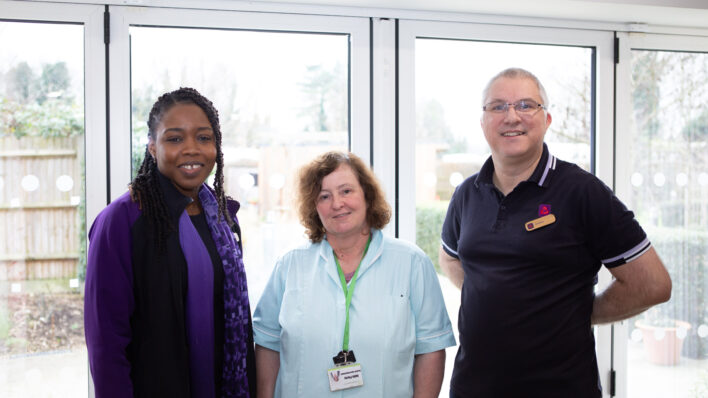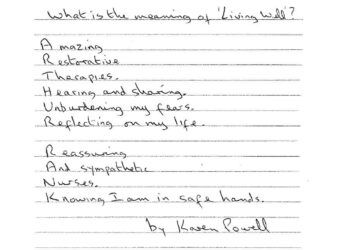NatWest visitors share how to avoid scams with Hospice patients
Share this story

Have you ever received a letter, email or telephone call from someone who are not who they say they are? Did it make you feel afraid or worried?
Fortunately, most people we meet are true and legitimate. The digital age has brought lots of new and exciting opportunities to make our lives easier, however it has also opened the possibilities to be ‘scammed’ and it is always good to question if correspondence is legitimate.
Andy Bishop and Oyin Petr-Ajayi, from NatWest bank in Petty Cury in Cambridge visited patients at the Living Well Service recently, to discuss this further and share ideas which may prevent them being scammed. They started by explaining the definition of a scam:
What are scams?
A scam is when someone tries to get your personal details for the wrong reasons and may find different ways to ‘trick’ you into getting them.
How do scams work?
Sadly, there are lots of ways people can be scammed today. Sometimes scammers may ask for personal details, such as your names, age, address, name of your pet, your mother’s maiden name etc. With this information they can build a profile about you so that when they contact you again, they can come across as sincere and genuine.
What do scammers do?
Scammers try to earn your trust. They try to get information and may even give you false advice such as, don’t go to your bank or talk to the police. Andy shared the different types of scams:
Purchase scams: Someone ‘sells’ you something and takes your money but the goods never arrive.
Investment scams: Scammers entice you to invest for the promise of big financial rewards!
Impersonation scams: Scammers pretend to be someone else, such as the police or bailiffs.
Romance scams: Scammers start a relationship (often online) and then ask you for money.
Money muling: Scammers ask for money or your bank account details to deposit money.
Rental scams: Scammers ask for a deposit to rent a property (that they don’t own or doesn’t even exist).
Andy and Oyin also shared some very useful tips and advice about how to spot and avoid a scam. They explained that scams often have a common pattern and there is often an urgency to their demands. Andy used an acronym called PAUSE:
P for Positioning
Think about the language they have used. Does it sound plausible or too good to be true?
A for Authority
Would the person [they claim to be] ask this?
U for Urgency
Take your time. Never feel pressured to make a quick decision. Ask a friend or relative what they think before you commit to something.
S for Scarcity
Are they saying this is a limited offer? You have been chosen etc. Are they playing on FOMO (fear of missing out)?
E for Emotion
If you feel rushed, fearful, sad or scared it is most probably a scam. It’s OK to say no. Work to your own time frame.
Top Tips to avoid being scammed
1. Keep your personal details private
Try not to give your personal details to anyone who doesn’t need them.
Avoid inputting your personal details (such as your mum’s maiden name, pet name etc.) on games on social media or the internet.
2. Code word
Have a ‘Code word’ for family members if they have to ask you for money or support in an emergency. Agree the word, or question, in advance. Something only you and that person would know.
3. Passwords
Use strong passwords. Don’t just have one password. Use numbers, capital letters, symbols etc.
Use a password manager to safely store and remember your passwords.
Don’t tell anyone your full password (legitimate organisations would never ask you for the full password).
Change your passwords regularly.
4. Social Media
Keep your social media accounts private (friends only).
Delete old social media posts.
Don’t post personal data, such as children on their birthday, photos while you are still on holiday or photos of your front door (with the door number) etc.
5. QR Codes
QR codes have become popular as a quick way to access information via a smart phone. You may have seen these on posters and leaflets (The Charity has started to use them too). Unfortunately, some scammers have been able to highjack the QR code, so you are taken to their scammed webpage and not the legitimate one.
Don’t enter your personal details (such as your name or bank details) via a QR code. Use the QR code to take you to a webpage for information only.
6. Strangers
Be wary of someone phoning, writing or knocking on your door and offering a service or wanting to come in.
Ask for ID, close and lock your door (or put the phone down) and find their telephone number independently (not the one on their card or letter) and ring it to check. Anyone who is legitimate, would understand and would not mind waiting.
Keep your doors locked.
Install a spy hole or ring doorbell.
7. Protection Tools
Use protection tools offered from your bank and other organisations, such as 2 factor authentication (this will often mean entering a number which you have been texted).
8. Support
Speak to your bank, police, action fraud etc. if you think you may have been scammed.
The patients were able to share their own personal stories and concerns and Andy and Oyin made suggestions for them. They concluded by recommending the Action Fraud Website (National Fraud & Cyber Crime Reporting Centre) for more information or telephone 0300 123 2040.
The Charity thanks Andy and Oyin for an interesting and informative session and looks forward to further visits.
View other stories
-

Russell shares his Living Well experience
"There’s a very, very good and tight family atmosphere here"
-

Susan shares her Living Well Experience
"I wanted to come somewhere just to think about having hope, when living with a condition like this"
-

Patients ‘Love to Move’ at the Alan Hudson Centre
Patients at the Alan Hudson Centre in Wisbech get moving
-

Living Well poems
Some wonderful poems penned by a patients and relatives of the Living Well Service




